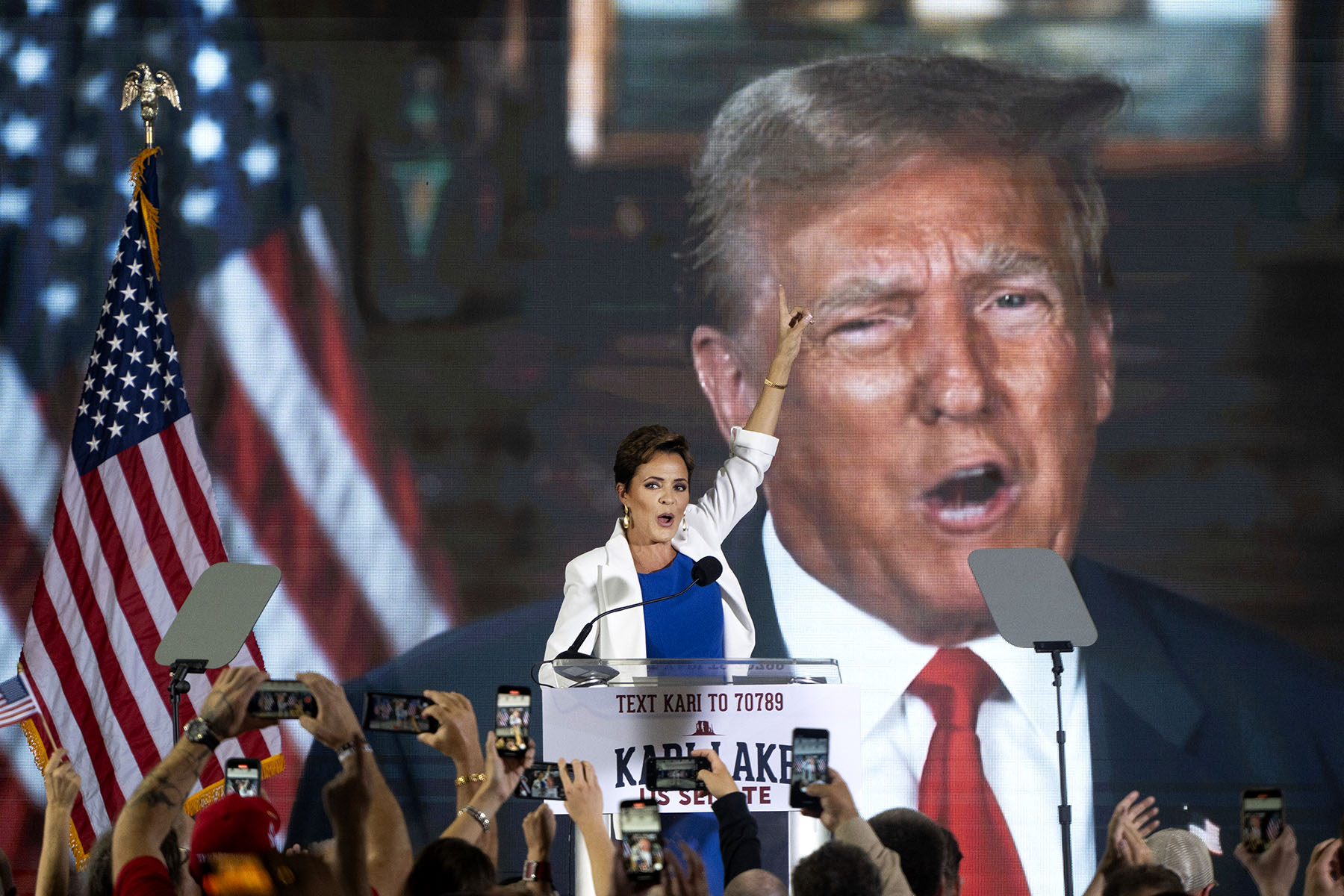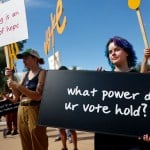Republican Kari Lake on Tuesday kicked off her 2024 Senate bid in Arizona while still contesting her legitimate loss in last year’s gubernatorial race.
Addressing hundreds of supporters in an airplane hangar at the Scottsdale headquarters of the luxury lifestyle publication Jetset Magazine, Lake’s promise that she is “not going to retreat” was a faint echo of the staunch election denialism that defined her 2022 campaign.
“I am going to stand on top of this hill with every single one of you, and I know you’re on my side as I formally announce my candidacy for the United States Senate,” said Lake, focusing instead on border security, the fentanyl drug crisis and water access in the arid state.
Lake first rejected Democrat Joe Biden’s 2020 White House victory over Republican Donald Trump, a political mentor. Then, in the closing days of her own 2022 race against Democrat Katie Hobbs, who was then the secretary of state, Lake began to suggest the results would be illegitimate. Lake lost to Hobbs by about 17,000 votes — less than a percentage point — and has refused to concede, instead challenging the results by filing multiple lawsuits, none of which have been successful.
“Fighting for honest elections is not a Republican issue, it’s not a Democrat issue, it’s an American issue,” Lake said at the rally.
Lake enters what could be a three-way general election race in a year when the Arizona seat is one of just three the nonpartisan Cook Political Report rates as a true “toss-up” contest — and one of the only competitive Senate races expected to feature a GOP woman. The seat is currently held by Sen. Kyrsten Sinema, who flipped the seat for Democrats in 2018 but announced late last year she would leave the party and register as an independent. Sinema has not formally announced her plans to run for reelection but political advisers have started mapping out the coalition of voters the prolific fundraiser would need to win the state as an independent. Rep. Ruben Gallego is the front-runner for the Democratic nomination.
Arizona’s electorate is divided roughly into thirds between Democrats, Republicans and independents. The independents include political moderates but also progressives who might identify with the Green Party and some Libertarian-leaning voters who find themselves increasingly at odds with Arizona’s Republican Party, which veered further to the right during Trump’s presidency and further into conspiracy theories after his subsequent loss. An influx of voters from states such as California and Washington have changed Arizona’s demographics, creating an opening for Democrats in the historically Republican state. In 2020, Biden became the first Democratic presidential candidate to win Arizona since Bill Clinton’s reelection in 1996. The same year, for the first time since the 1950s, the state sent two Democratic senators to Washington.
Lake is a former local television anchor who, like her mentor, frequently lambasts “fake news.” Her decision to launch her Senate campaign at Jetset’s headquarters bore Trump’s imprint. The magazine, which describes its audience as “the wealthiest demographic in the world,” published an article headlined “Why America Needs Donald Trump” in 2015 during the former president’s nascent White House bid. Trump appeared at Lake’s rally via video to endorse her as “one of the toughest fighters in our movement.” Trump himself often campaigned in hangars after dramatic arrivals via private jet.
Gallego, whom Lake recently confronted in the Phoenix airport over border issues, welcomed his competitor to the race on X, the social media website formerly known as Twitter.
“I look forward to substantive discussions on *checks notes* your plan to ban abortion without exception, your undermining of our democracy, and threats of violence. That’s why voters rejected you the first time around and we’ll do it again,” Gallego posted during Lake’s rally.
Gallego’s mention of political violence likely referred to statements Lake has made regarding some of the individuals attempting to hold Trump accountable for alleged election interference. Over the summer, Lake told a group of Georgia Republicans that she and “75 million Americans” stood between Trump and prosecutors.
“And I’m going to tell you, most of us are card-carrying members of the NRA. That’s not a threat, that’s a public service announcement,” Lake said.
Abortion was front and center in the state’s gubernatorial race last year and is expected to be again in 2024 races. Arizona currently bans abortion after 15 weeks of pregnancy, but for a period after the Supreme Court overturned Roe v. Wade in June 2022, ending federal abortion rights, abortion was on hold as the state’s Republican leaders wrangled over whether an 1864 law or 2021 personhood measure preempted the 15-week ban. During her gubernatorial campaign, Lake praised strict abortion bans in Arizona and elsewhere, calling abortion the “ultimate sin.” Then, in her campaign’s final weeks, Lake said on a local radio program that abortion should be “rare and legal” and “rare but safe,” evoking language Clinton used in the 1990s that the Democratic Party has since moved away from. A spokesperson later said that Lake meant to say only “rare but safe” and that Arizona’s 15-week ban met that standard.
Senate Majority PAC, a national fundraising organization that supports Democratic candidates in Senate races, said Lake’s candidacy is Senate Minority Leader Mitch McConnell’s “worst nightmare come true” given her Trumpian stances as the party looks to regain control of the upper chamber next year.
Lake’s campaign did not respond to a request for comment.
The National Republican Senatorial Committee, or NRSC, is the arm of the national Republican Party that supports Senate candidates. After the GOP failed to regain Senate control in the 2022 midterms, NRSC Chair Sen. Steve Daines announced earlier this year that the organization would break with its tradition of neutrality in primaries to play a larger role in recruiting candidates. At the time, some Republican strategists told The 19th that the change in approach could lead to more GOP women in the upper chamber. But as the NRSC began to zero in on recruiting wealthy candidates with the ability to self-fund their own campaigns, it looks increasingly likely that most of the competitive Senate races next year will feature Republican men, making Lake an outlier among her party’s candidates.
The NRSC did not respond to a request for comment on Lake’s entry into the race.
Lake met with several Senate leaders during a trip to Washington earlier this month ahead of launching her campaign. Daines told ABC News that they had “productive conversations.”








